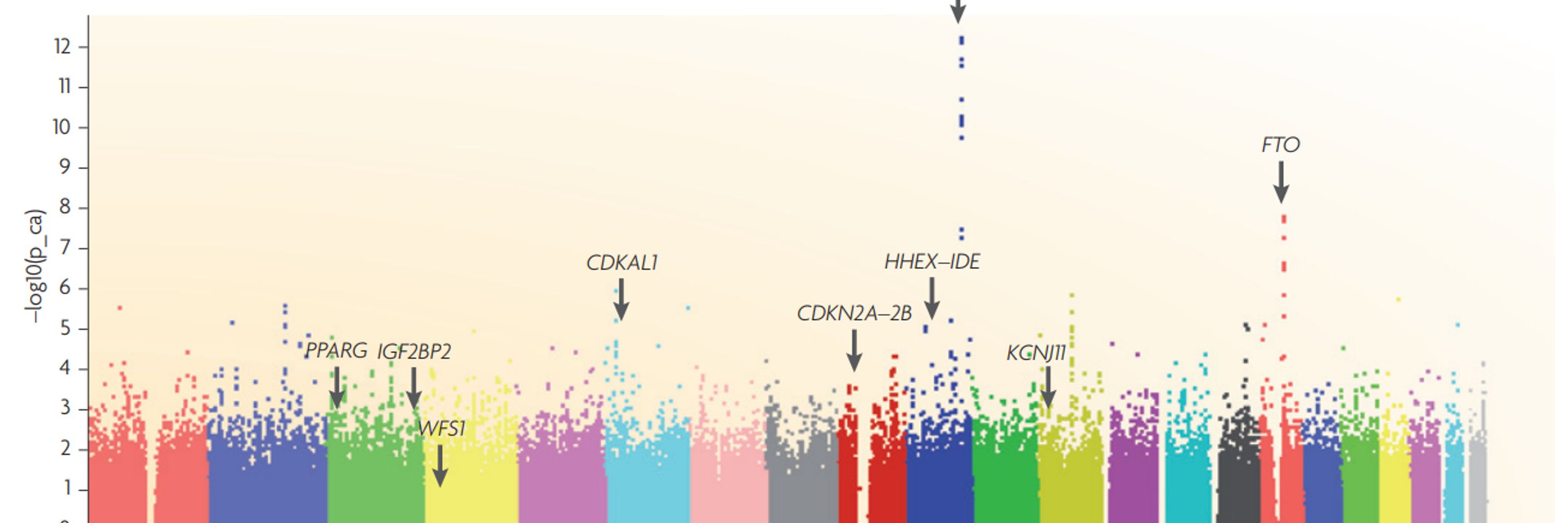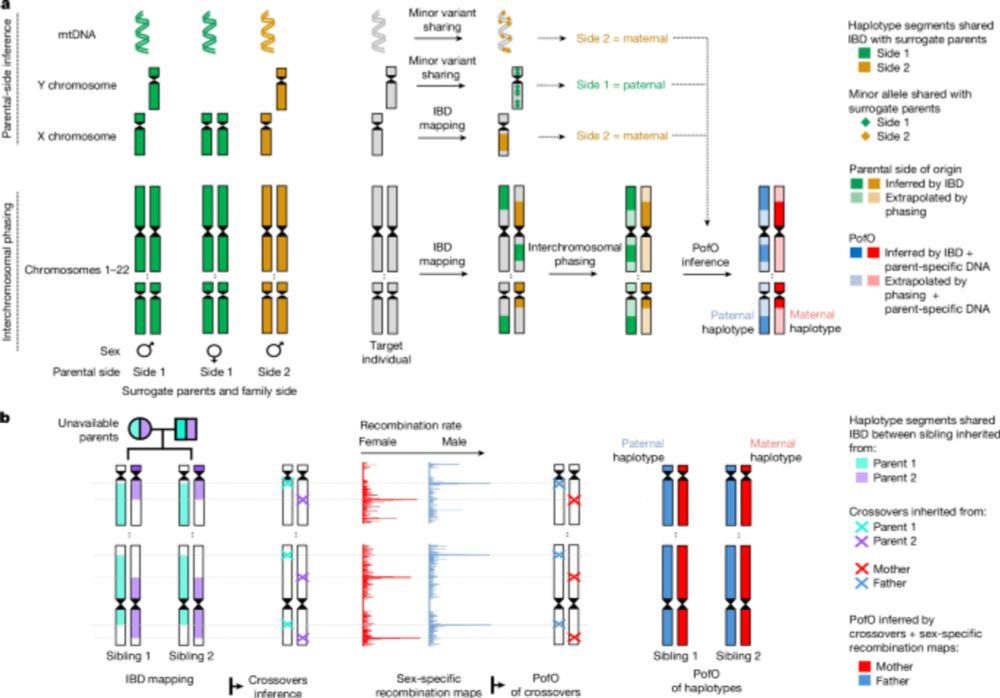
Tim Frayling
@timfrayling.bsky.social
Human genetics, type 2 diabetes and obesity in today's environment. Cycling uphill. Team science. New shoots in Geneva & France, long roots in the UK & Exeter. https://www.unige.ch/medecine/gede/en/research-groups/timothy-frayling
the last one was a nice review from Hanieh Yaghootkar, this is the partitioned PRS paper: www.nature.com/articles/s41...

Genetic subtyping of obesity reveals biological insights into the uncoupling of adiposity from its cardiometabolic comorbidities - Nature Medicine
Genotype-phenotype data from over 450,000 individuals was analyzed to discover 205 genomic loci where an allele associated with increase adiposity was associated with a lower cardiometabolic disease r...
www.nature.com
November 7, 2025 at 9:48 AM
the last one was a nice review from Hanieh Yaghootkar, this is the partitioned PRS paper: www.nature.com/articles/s41...
For more details about the Swiss personalised Health Network and the safe way trained researchers can work with data from multiple hospitals : sphn.ch/network/proj...

Projects - SPHN
Projects Implementation Projects The SPHN implementation projects aim at developing the core infrastructure which is required to make health-related data FAIR* at the national level. Using a top-down ...
sphn.ch
September 8, 2025 at 6:58 PM
For more details about the Swiss personalised Health Network and the safe way trained researchers can work with data from multiple hospitals : sphn.ch/network/proj...
When you say "nobody" do you mean "nobody outside of your health care providers" ? your hospital will use your data all the time to help audit and improve their services ?
September 8, 2025 at 6:45 PM
When you say "nobody" do you mean "nobody outside of your health care providers" ? your hospital will use your data all the time to help audit and improve their services ?
smart work aged 8. but possibly redundant for 17 years time when birth rates in europe may be 0.1 per couple. Maybe aged 85 : lose large amount of money to pay for private social care ?
September 5, 2025 at 2:58 PM
smart work aged 8. but possibly redundant for 17 years time when birth rates in europe may be 0.1 per couple. Maybe aged 85 : lose large amount of money to pay for private social care ?
thanks Laura. Yes I think the 1st slide on PRS talks needs to be "do not compare PRS to clinical genetics, compare to the common, equally bad & equally good , stuff your doctor measures all the time to stratify you - LDLC, blood pressure, family history, ancestry and BMI" (to add to your age & sex)
September 1, 2025 at 12:48 PM
thanks Laura. Yes I think the 1st slide on PRS talks needs to be "do not compare PRS to clinical genetics, compare to the common, equally bad & equally good , stuff your doctor measures all the time to stratify you - LDLC, blood pressure, family history, ancestry and BMI" (to add to your age & sex)
yes . I guess my slight air of frustration is that we have known for while that PRS are complementary to other risk factors e.g. journals.plos.org/plosmedicine...

Polygenic risk scores in cardiovascular risk prediction: A cohort study and modelling analyses
Luanluan Sun and colleagues investigate whether adding polygenic risk scores to conventional risk factors of cardiovascular disease helps predict disease risk.
journals.plos.org
September 1, 2025 at 12:43 PM
yes . I guess my slight air of frustration is that we have known for while that PRS are complementary to other risk factors e.g. journals.plos.org/plosmedicine...
the first one does not seem to be the right question.
August 30, 2025 at 9:12 AM
the first one does not seem to be the right question.
great stuff but why compare with PRS ? I do not think anyone is suggesting we should use one and not the other ? Can we not have our PRS cake and eat the EHRs :-)
August 30, 2025 at 9:11 AM
great stuff but why compare with PRS ? I do not think anyone is suggesting we should use one and not the other ? Can we not have our PRS cake and eat the EHRs :-)
similar scenario for height. even though the common genetics is "saturated" the height range one person could be based on their PRS is very wide. (which is of course a separate argument compared to using PRS to stratify people)
August 8, 2025 at 9:14 AM
similar scenario for height. even though the common genetics is "saturated" the height range one person could be based on their PRS is very wide. (which is of course a separate argument compared to using PRS to stratify people)
nice summary thanks Andrea. I wonder if this challenge will become easier in a few years if and when clinicians inform a young adult patient they would like to "do" their genetics at the same time as their first blood pressure/FEV/LDL-cholesterol etc test.
August 7, 2025 at 1:47 PM
nice summary thanks Andrea. I wonder if this challenge will become easier in a few years if and when clinicians inform a young adult patient they would like to "do" their genetics at the same time as their first blood pressure/FEV/LDL-cholesterol etc test.
Reposted by Tim Frayling
Dirigée par @zkutalik.bsky.social et @rjhfmstr.bsky.social à la @fbm-unil.bsky.social, au @sib.swiss et à #unisanté, une nouvelle étude publiée dans @nature.com présente une méthode computationnelle innovante pour étudier ces effets liés à l’origine parentale.
🔗 www.nature.com/articles/s41...
🔗 www.nature.com/articles/s41...

Parent-of-origin effects on complex traits in up to 236,781 individuals - Nature
A novel multistep strategy reveals how parent-of-origin effects shape complex traits in large-scale biobanks.
www.nature.com
August 7, 2025 at 9:42 AM
Dirigée par @zkutalik.bsky.social et @rjhfmstr.bsky.social à la @fbm-unil.bsky.social, au @sib.swiss et à #unisanté, une nouvelle étude publiée dans @nature.com présente une méthode computationnelle innovante pour étudier ces effets liés à l’origine parentale.
🔗 www.nature.com/articles/s41...
🔗 www.nature.com/articles/s41...
Does it even make sense to compare PGS to proteomic risk scores though ? one is a once in a lifetime assay that costs about $40. the other....is not. The most relevant comparison for proteomic scores is likely to be routine biochemistry ?
July 16, 2025 at 1:22 PM
Does it even make sense to compare PGS to proteomic risk scores though ? one is a once in a lifetime assay that costs about $40. the other....is not. The most relevant comparison for proteomic scores is likely to be routine biochemistry ?
The Pope Song by Tim Minchin would be a controversial choice
July 14, 2025 at 5:33 PM
The Pope Song by Tim Minchin would be a controversial choice

